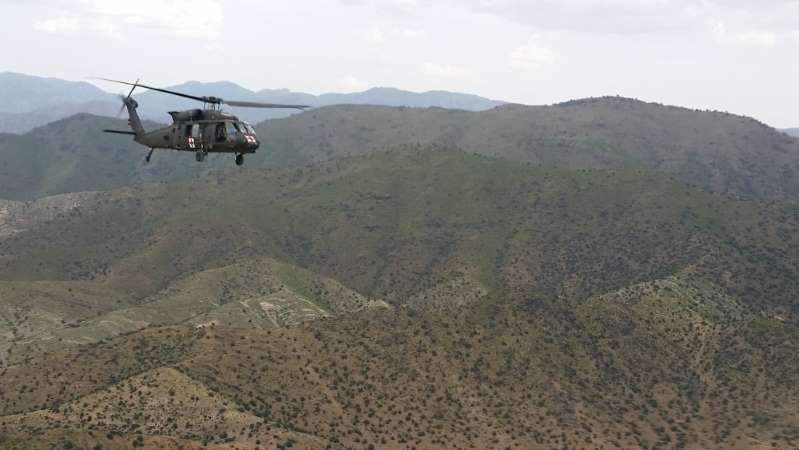Exclusive: U.S. Citizen Kidnapped By Taliban Group in Afghanistan

An American contractor was captured by Taliban-aligned militants in Afghanistan last week, triggering a country-wide recovery effort, Newsweek has learned.
Mark R. Frerichs of Lombard, Illinois, was kidnapped last Friday in Khost, a province located in the southeastern part of the country that borders the Federally Administered Tribal Areas, an underdeveloped region between Afghanistan and Pakistan, U.S. officials told Newsweek, who spoke on condition of anonymity because they were not authorized to discuss the details publicly.
Frerichs, 57, is a former U.S. Navy diver and the managing director for International Logistical Support, a U.S. government contractor. According to his LinkedIn account, he has worked as a civil engineer in several conflict zones from Iraq to Sudan during the past 10 years, where he has consulted on logistical contracts for both governments and non-governmental organizations. U.S. officials told Newsweek Frerichs had regularly traveled to Afghanistan since 2012.
While no group has claimed responsibility for the kidnapping, U.S. officials believe the Taliban-aligned Haqqani network orchestrated the operation. Newsweek was unable to determine exactly how Frerichs was captured, but efforts to locate and recover him include a joint effort by Departments of State and Defense, along with the Federal Bureau of Investigation. If hostage rescue becomes an option for military commanders, typically the mission would be given to U.S. special operation forces.
During the past few days, American forces carried out both ground and intelligence-gathering operations to track the whereabouts of Frerichs while navigating difficult Afghan topography and severe winter weather that has prevented overhead surveillance missions by U.S. military drones.
Newsweek first learned about the kidnapping on Monday. The Hostage Recovery Fusion Cell, a multi-agency team based at FBI Headquarters in Washington, D.C., asked Newsweek to hold the story until efforts to recover Frerichs progressed, and the publication agreed.
"The welfare and safety of U.S. citizens abroad is one of the highest priorities of the Department of State," said Holly Jensen, a spokeswoman for the Hostage Recovery Fusion Cell. "We have no further comment."
A Defense Department spokesman referred questions to the State Department.
The FBI's Hostage Recovery Fusion Cell was established in June 2015 by former President Barack Obama after ISIS militants beheaded journalists such as James Foley and Steven Sotloff to support families through the hostage negotiation process and to better coordinate the government agencies tasked with recovery.
As of 2018, more than 180 American citizens captured by criminal groups or foreign terrorist organizations have been brought back to the U.S., according to the FBI.
Scott Olson, who served as the FBI's legal attache in Baghdad from 2013 to 2015, told Newsweek that the State Department brings in the FBI to handle negotiations during kidnapping situations. He referred to the FBI's crisis negotiation team as the "eye of the storm."
The Haqqani network was once a CIA-backed force that fought against Soviet attempts to establish a satellite state in Afghanistan. It later became one of the most formidable insurgent groups that the United States faces within the country and has been behind other kidnappings that target U.S. and other foreign nationals.
In November, three senior Haqqani network officials were released in exchange for one U.S. citizen and an Australian citizen kidnapped in 2016. Secretary of State Mike Pompeo called the exchange a "goodwill gesture" at the time, and President Donald Trump said he hoped that it could help pave the way toward a larger, more comprehensive agreement with the Taliban.
Trump has sought to strike a peace deal with the Taliban and to oversee
direct talks between the militant group and the U.S.-backed government in Kabul. The negotiations have stalled and restarted, however, as violence across Afghanistan continued.
Despite the violence, U.S. officials told Newsweek that they were soon expecting an agreement to establish peace with the Taliban. The Defense Department has plans to withdraw the roughly 14,000 American personnel in Afghanistan to about one-third of that force strength with the aim of ending the longest war in U.S. history.
More than 2,400 Pentagon personnel have been killed in Afghanistan since 2001, the year the United States intervened to oust the government led by the Taliban and that was allied with Al-Qaeda in the wake of the September 11, 2001 attacks.
The congressionally mandated Office of the U.S. Special Inspector General for Afghanistan Reconstruction found in its latest report, published Tuesday, that the number of attacks launched by the Taliban and other militants in the last three months of 2019 was at a higher level than in that same period of any year since recording began in 2010.
Photo: Captain Cody Sneed/Bob Harrison/U.S. Forces Afghanistan/U.S. Army Pilots and crew of a UH-60 Blackhawk helicopter flying a routine training mission over Khost Province, Afghanistan. Even as U.S.-Taliban peace talks persist, Afghanistan continues to be ravaged by record levels of violence and unrest.




